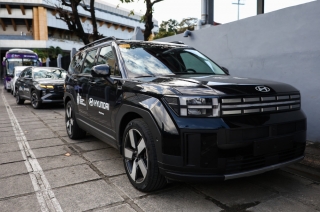
Ford Motor together with General Electric (GE) Healthcare plans to produce 50,000 ventilators within the next 100 days. These healthcare machines will be produced at a facility in Michigan to help aid health workers in the fight against the Coronavirus.
Due to the said virus, many automotive companies have had to shut down temporarily in order to help curve the spread of the virus. This, however, will cost these companies greatly in terms of their profits and operational costs. Instead of staying dormant many of these automotive brands have decided to shift their workforce into something much suited for the times. These automotive companies will now be producing personal protection and medical equipment instead.
According to executives from Ford and GE, the production of the 50,000 ventilators is expected to begin with help from 500 United Auto Workers union members on the week of April 20, 2020. The Blue Oval will be using its Rawsonville Components Plant in Ypsilanti, Michigan for this endeavor. The repurposed plant is said to be capable of producing 30,000 ventilators a month after early July according to the American brand’s officials.
The joint venture is expected to produce 1,500 ventilators by the end of April and another 12,000 are expected to be made by the end of May. The ultimate goal of the two brands is to reach the 50,000 units produced mark by July 4, 2020.
Both companies can’t just make a ventilator just from scratch, GE Healthcare is actually licensing the ventilator systems from a small company called Airon Corp based in Florida. The small company specializes in pneumatic life support products. While these ventilators aren’t exactly the same models that GE and Ford said that they will produce, these are far less complex and are easier to make. In opting for these simple yet effective devices it will enable both companies to reach their goal faster and get ventilators out to those who need it faster. The President of GE Healthcare, Tom Westrick, assures the public that even if these are more “basic” ventilators, these are still “well-suited to address the urgent needs during the COVID-19 crisis.
Latest News
-
Geely’s EX2 EV headed to Australia — is a Philippine launch possible? / News
The Geely EX2 is confirmed to go on sale in Australia in 2026. Could a launch in the Philippines also be on the cards?
-
Hyundai Motor Philippines is the FIFA Futsal Women's Teams' official mobility partner / News
Hyundai Motor Philippines strengthened its partnership with FIFA through its support of the FIFA Futsal Women's Teams.
-
Kia Philippines backs EJ Obiena as Atletang Ayala continues championing Filipino athletes / News
Kia Philippines strengthens its support for EJ Obiena, backing the Olympian with dedicated mobility at home and abroad.
Popular Articles
-
Electric Vehicles in the Philippines for under P1 million
Jerome Tresvalles · Aug 19, 2025
-
Top 3 Cars For Every Lifestyle—What Cars Are Right For You? | Behind a Desk
Caco Tirona · Apr 24, 2024
-
5 Tips to Maximize Fuel Efficiency
Jerome Tresvalles · Sep 09, 2024
-
Five driving habits that are draining your fuel tank
Jerome Tresvalles · Jun 24, 2025
-
Can engine braking harm your engine?
Jerome Tresvalles · Sep 11, 2025
-
Do electric cars even need maintenance?
Jerome Tresvalles · Oct 23, 2024
-
Best vehicles for an active outdoor lifestyle
Shaynah Miranda · Jul 25, 2024
-
How to drive different types of vehicle transmissions
May 23, 2024
-
5 easy ways to keep your car interior clean
Allysa Mae Zulueta · Nov 15, 2021
-
How to survive Metro Manila traffic
Earl Lee · Aug 16, 2022



